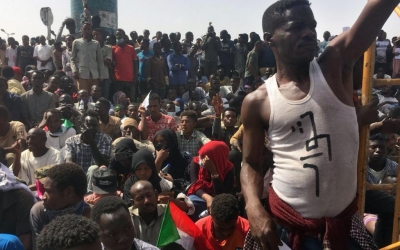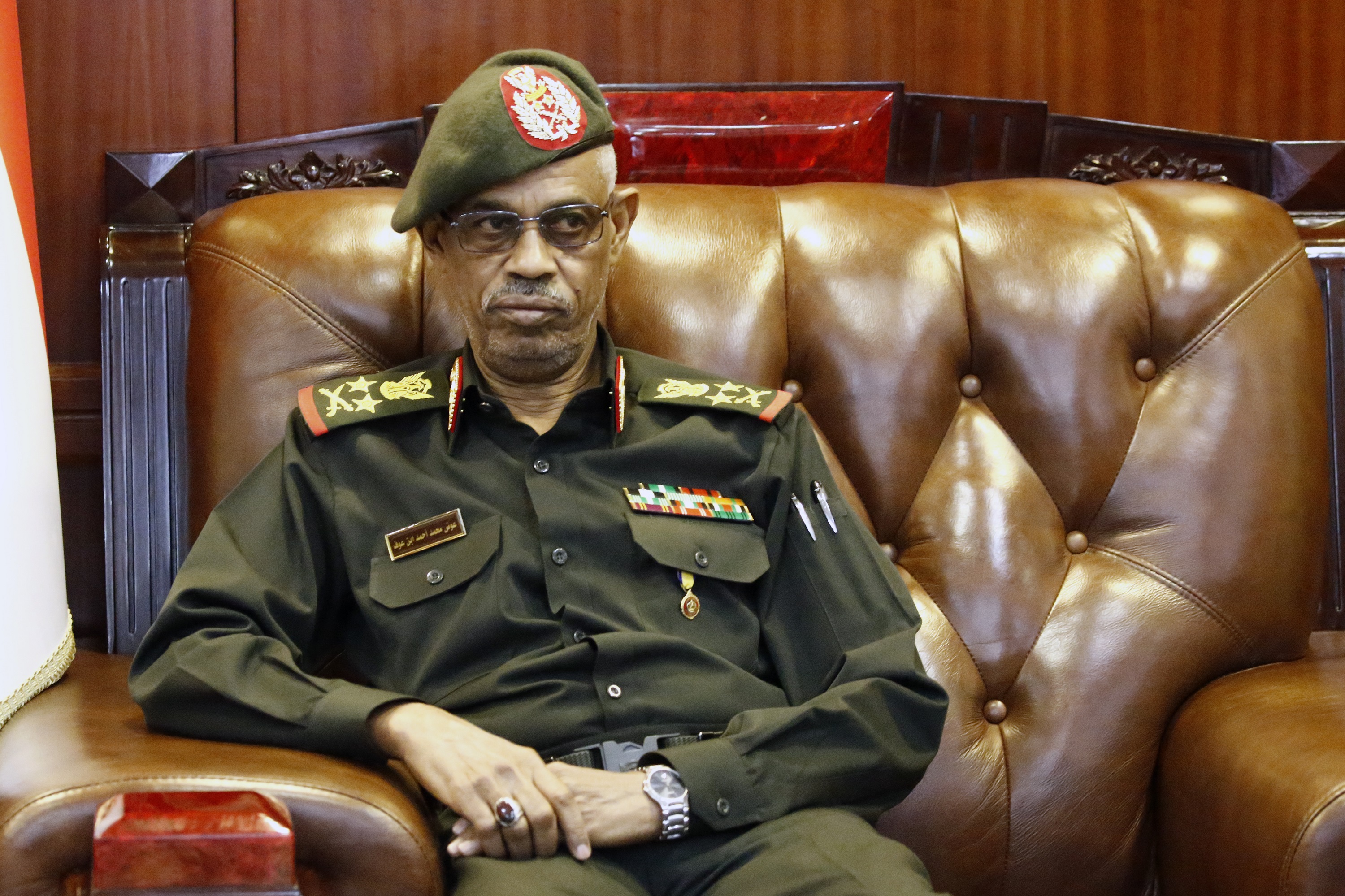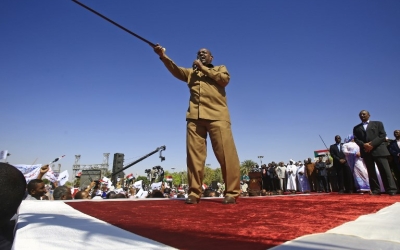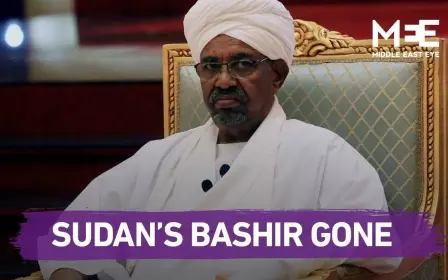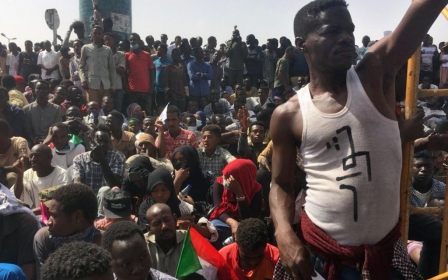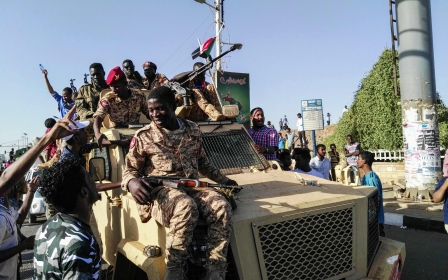Military coup ousts Sudan's Bashir as protesters demand civilian government
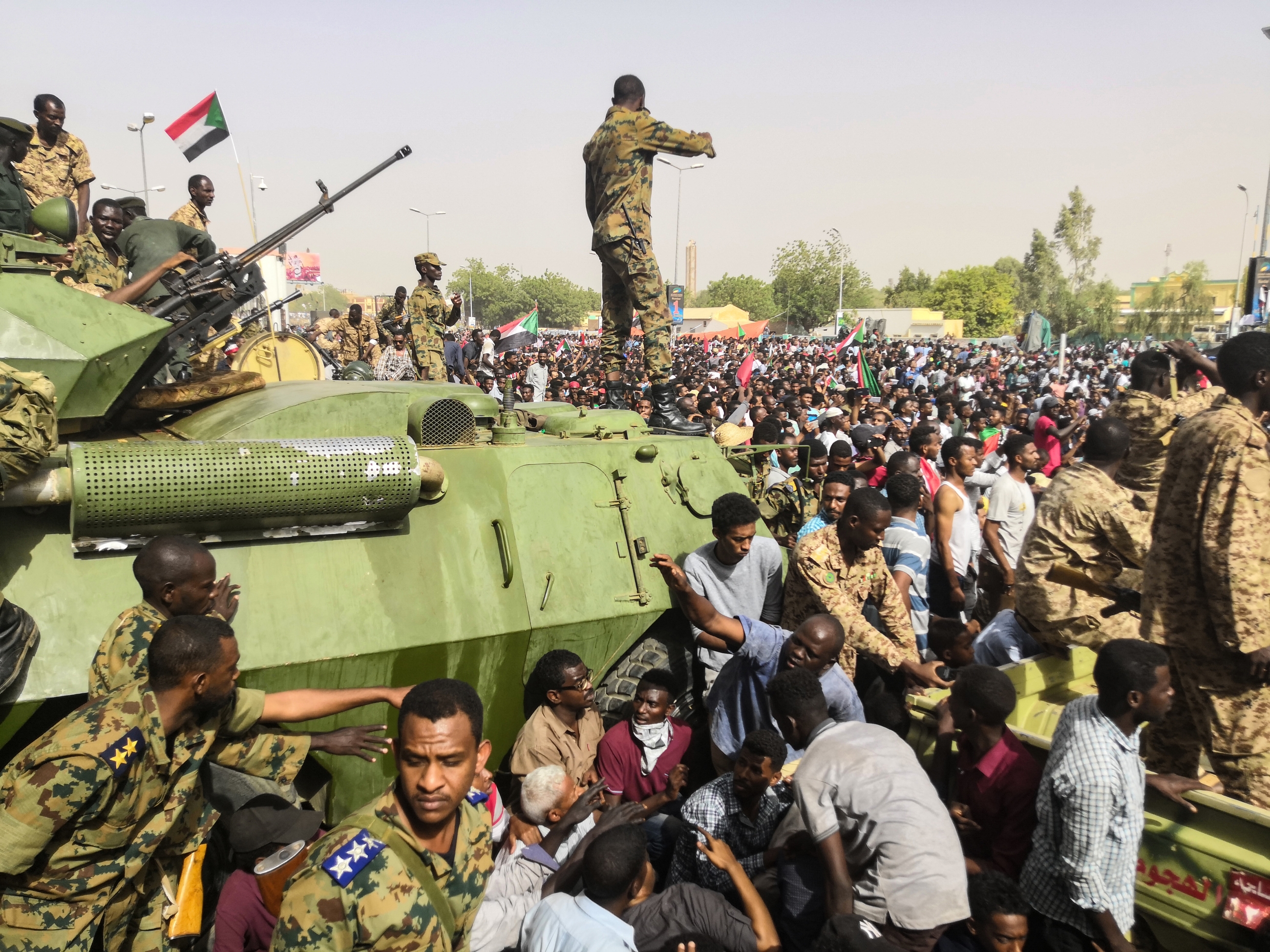
Sudan’s military on Thursday overthrew President Omar al-Bashir, who ruled Sudan in autocratic style for nearly 30 years, but protesters' jubilation quickly gave way to anger as they took to the streets demanding military leaders hand over power to civilians.
Bashir, 75, had faced 16 weeks of demonstrations against his rule. Announcing the ouster, Defence Minister Awad Mohamed Ahmed Ibn Auf said Sudan would enter a two-year period of military rule to be followed by presidential elections.
Speaking on state television, he said Bashir had been detained and transferred to a "safe place", adding that a military council would now run the country.
Ibn Auf, appointed first vice president by Bashir in February as the protests intensified, will head the military council, state TV said late Thursday. The Sudanese military's chief of staff Kamal Abdel Marouf al-Mahi will be deputy head.
Ibn Auf announced a state of emergency, a nationwide ceasefire and the suspension of the constitution. Seated on a gold-upholstered armchair, he said Sudan's airspace would be closed for 24 hours and border crossings shut until further notice.
New MEE newsletter: Jerusalem Dispatch
Sign up to get the latest insights and analysis on Israel-Palestine, alongside Turkey Unpacked and other MEE newsletters
The main organiser of the months-long protests against Bashir, the Sudanese Professionals Association (SPA) - an umbrella group of labour organisations - rejected the minister's plans. They called on protesters to maintain a sit-in outside the defence ministry that began last Saturday.
Shortly afterwards, tens of thousands of demonstrators packed the streets of the capital Khartoum, their mood changed from celebration over Bashir's expected departure to frustration at the announcement of the military-led transition.
National flags were waved over the vast crowds, which included families, women and people of all ages. "Fall, again!" many chanted, adapting an earlier anti-Bashir slogan of "Fall, that's all!"
Some wrote anti-Ibn Auf slogans on their clothes.
Sudanese sources told Reuters that Bashir was at the presidential residence under "heavy guard".
Curfew defied
State television said a nighttime curfew would be imposed from 10pm to 4am local time.
In a clear challenge to the military council, several thousand protesters remained in front of the defence ministry compound and in other parts of the capital as the curfew went into effect.
They chanted: "They removed a thief and brought a thief!" and: "Revolution! Revolution," according to a Reuters report.
#Sudan 🇸🇩: the nationwide curfew has gone into effect, yet in #Khartoum nobody seems to be going home tonight. pic.twitter.com/zRfXZR2UA9
— Thomas van Linge (@ThomasVLinge) April 11, 2019
Some shops in Omdurman, across the River Nile from central Khartoum, remained open past 10pm, a Reuters witness said.
"To comply with the curfew is to recognise the clone rescue government," SPA said. "Stay put and guard your revolution."
SPA also said the sit-in will not end until power is handed to a civilian transitional government. Omar Saleh Sennar, a senior SPA member, said the group expected to negotiate with the military over a transfer of power.
US suspends talks
The United States said it was suspending talks with Sudan on normalising relations. The State Department ordered non-emergency US government employees to leave the country and warned Americans against travelling to Sudan amid "crime, terrorism, civil unrest, kidnapping and armed conflict".
The State Department, while declining to declare the takeover a coup, said Washington supported a peaceful and democratic Sudan and believed the Sudanese people should be allowed a peaceful transition sooner than two years from now.
"The Sudanese people should determine who leads them in their future," State Department spokesman Robert Palladino told a news briefing. "The Sudanese people have been clear that they have been demanding a civilian-led transition. They should be allowed to do so sooner than two years from now."
British Foreign Secretary Jeremy Hunt called for a "swift move to an inclusive, representative, civilian leadership", saying in a tweet that a "military council ruling for 2 years is not the answer".
Bashir has been indicted by the International Criminal Court in The Hague and is facing an arrest warrant for crimes committed in Sudan's Darfur region during an insurgency that began in 2003 and led to the death of about 300,000 people. He denies the allegations.
He defied the court by visiting several ICC member states. Diplomatic disputes broke out when he went to South Africa in 2015 and Jordan in 2017 and both failed to arrest him.
Bashir's downfall was the second time this month that a leader in the region has been forced out after mass demonstrations. Algeria's ailing former president Abdelaziz Bouteflika, in power since 1999, stepped down on 2 April after six weeks of protests against him extending his rule.
Who is Ibn Auf?
Ibn Auf has long been among the senior leadership.
A career soldier trained in Egypt, Sudanese General Ahmed Awad ibn Auf went to the same military academy in Cairo as Egyptian President Abdel Fattah el-Sisi.
During his long military career, he served as the director of military intelligence and deputy commander of the armed forces. After his retirement from the army in 2010, he became a diplomat, serving as consul general in Cairo before becoming Sudan's ambassador to Oman.
In 2015, Bashir appointed him as defence minister.
In February, ibn Auf struck a conciliatory tone towards the anti-government protests, saying that young people protesting against the government had a "reasonable ambition".
Still, that wasn't always the case, in January he rebuked the protest campaign, vowing that the armed forces would not compromise over the country's security and leaders.
On Thursday, he announced the release of all political prisoners, and images circulated of freed detainees joining the protests, Reuters reported.
In Port Sudan and Kassala, another eastern city, protesters attacked the offices of Sudan's intelligence and security service, witnesses said.
Amnesty International expressed alarm at the "raft of emergency measures" announced on Thursday.
Bashir's legacy
Bashir, a former paratrooper who seized power in a bloodless coup in 1989, has been a divisive figure who has managed his way through one internal crisis after another while withstanding attempts by the West to weaken him.
Sudan has suffered prolonged periods of isolation since 1993, when the United States added Bashir's government to its list of terrorism sponsors for harbouring militants. Washington followed up with sanctions four years later.
A long civil war with southern separatists ended in 2005 and South Sudan became an independent country in 2011.
Since December, Sudan has been rocked by persistent protests sparked by the government's attempt to raise the price of bread and an economic crisis that has led to fuel and cash shortages.
From the start, the protests called for Bashir's downfall. Opposition unions of medics and other professionals have played a prominent role, as have women and young people in general. Security forces responded with tear gas, arrests and occasionally live ammunition, killing dozens.
Since the weekend, the protests have become more intense.
Clashes erupted between soldiers trying to protect the protesters and intelligence and security personnel trying to disperse them. About 20 people have been killed since the sit-in began.
Activists abroad pressed for Sudan to turn over Bashir to the ICC.
"Victims of the gravest crimes in Darfur should not have to wait any longer for justice," said Jehanne Henry, associate director at the Africa division of Human Rights Watch.
Middle East Eye delivers independent and unrivalled coverage and analysis of the Middle East, North Africa and beyond. To learn more about republishing this content and the associated fees, please fill out this form. More about MEE can be found here.


